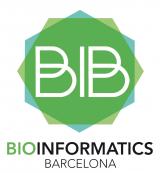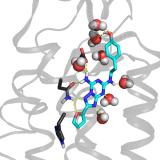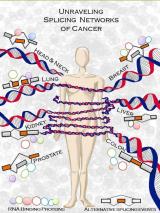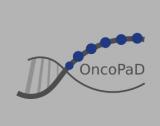
05/01/2017
Gens i bytes: la IV Jornada de Bioinformàtica i Genòmica reuneix els experts en la matèria de l’àmbit català
El GRIB va participar en aquesta quarta edició en la que els organitzadors de la jornada han rebut més de setanta estudis, dels quals una vintena es van presentar oralment. Alguns investigadors catalans vénen des de llurs centres de treball actuals a Suècia, els Estats Units o la Gran Bretanya, i tornen per un dia al seu lloc d'origen per bescanviar coneixements i promoure col·laboracions. L'acte d'inauguració va comptar amb l'actual secretari d'Universitats i Recerca de la Generalitat de Catalunya, el Sr. Arcadi Navarro, científic de formació i especialitzat en bioinformàtica. A més, entre els ponents hi ha hagut dos investigadors dels dos centres de bioinformàtica més punters de la Gran Bretanya i d'Europa: l'European Bioinformatics Institute (EMBL-EBI) i el Wellcome Trust Sanger Institute. L'empresa europea de serveis digitals ATOS va ser el patrocinador tecnològic aportant una xerrada sobre computació d'altes prestacions o High-Performance Computing (HPC), i la DAMM va patrocinar l'espai de treball en xarxa (networking).

16/12/2016
Genomics and the conservation of species: insights from the Iberian lynx
Genetic erosion following extreme population declines can become an added burden for the recovery of endangered species. A study just published in Genome Biology based on whole genome sequences of the Iberian lynx reports extremely low levels of genetic diversity and an excess of deleterious variants as major consequences of serial population contractions. Genomic studies of endangered species like this are providing insights into patterns of genomic erosion and how they can affect species viability. Hopefully, genomics will also contribute to saving species from extinction, adding a new tool to the species conservation toolbox.
The Evolutionary Genomics group of GRIB (IMIM-UPF) led by Mar Albà has participated on this study coordinated by the CSIC.
Reference: Abascal et al. (including Alba MM, Villanueva-Cañas JL, Ruiz-Orera, J). Genome Biology. 14th Dec 2016. DOI: 10.1186/s13059-016-1090-1. https://goo.gl/dobxiW

09/12/2016
The Bioinformatics Barcelona Association presents the Research Program on Biomedical Informatics
You're still in time to sign up for the third visit of the "Get BIB", focused on this occasion on the Research Program on Biomedical Informatics (GRIB), joint research programme of the Hospital del Mar Medical Research Institute (IMIM) and the Department of Experimental and Health Sciences of UPF.
The presentation will take place on Monday 12 December from 10:00 to 12:00h at Ramón y Cajal room of Barcelona Biomedical Research Park (Doctor Aiguader, 88, Barcelona), and since seating is limited, it needs your attendance confirmation by sending an email to comunicacio@bioinformaticsbarcelona.eu

28/11/2016
A protein that defines the melanoma blueprint
Identified a new factor essential for the development of these aggressive tumours. This protein helps to define aspects that distinguish melanoma from other types of cancer
A recent publication at Nature Communications identified a new factor essential for the development of these aggressive tumours: the CPEB4, a protein that is crucial for melanoma cell survival. This protein helps to define aspects that distinguish melanoma from other types of cancer.
The Computational RNA Biology group of GRIB led by Eduardo Eyras has participated on this study headed by Marisol Soengas from the Spanish National Cancer Research Centre (CNIO), senior author of this paper, an expert in researching the "identity" of melanomas.
Reference article: Lineage-specific roles of the cytoplasmic polyadenylation factor CPEB4 in the regulation of oncogenic drivers in melanoma. Eva Pérez-Guijarro, Panagiotis Karras, Metehan Cifdaloz, Raúl Martínez-Herranz, Estela Cañón, Osvaldo Graña, Celia Horcajada, Direna Alonso-Curbelo, Tonantzin G. Calvo, Gonzalo Gomez, Nicolas Bellora, Erica Riveiro-Falkenbach, Pablo Otiz-Romero, José Luis Rodríguez-Peralto, Lorena Maestre, Giovanna Roncador, Juan C de Agustín Asensio, Colin R. Goding, Eduardo Eyras, Diego Megías, Raúl Méndez and María S. Soengas. Nature Communications (2016). DOI: http://dx.doi.org/10.1038/NCOMMS13418

25/11/2016
Thesis defence of Àlex Bravo Serrano: "BeFree: a text mining system for the extraction of biomedical information from the literature"
Next Monday, 28th of November at 11:00, Àlex Bravo Serrano, member of the Integrative Biomedical Informatics group of GRIB will defense his thesis "BeFree: a text mining system for the extraction of biomedical information from the literature" at Josep Marull room of the Universitat Pompeu Fabra.

18/11/2016
Thesis defence of José Carlos Gómez Tamayo: "Development and application of computational techniques to drug discovery and structure-function relationships"
Next Friday, 25th of November at 11:30, José Carlos Gómez Tamayo, member of the PharmacoInformatics group of GRIB will defense his thesis "Development and application of computational techniques to drug discovery and structure-function relationships" at PRBB Auditorium.

3/10/2016
Project EU-ToxRisk and US Initiative Tox21 new collaboration
The EU-ToxRisk project and the Toxicology in the 21st Century (Tox21) initiative in the US have agreed to collaborate on efforts to reduce the use of animals and achieve more efficient chemical safety assesments. A total of 28 representatives from both projects gathered in a workshop held in Mainz (Germany) on the 12th-14th September 2016 to initiate collaboration across areas of mutual interest within the field of risk assessment.
Two groups of GRIB participate in the EU-ToxRisk project coordinating the application of computational methods: the PharmacoInformatics group led by Manuel Pastor and the Integrative Bioinformatics group led by Ferran Sanz, and therefore will play a major role in this collaboration. In particular, the GRIB will participate in the joint development and validation of core methodologies for hazard and risk assessment, as read-across, quantitative AOP and similarity metrics.
You can find further information in the EU-ToxRisk-Tox21 joint Press Release (in english) and the translation into catalan and spanish at the UPF website.

22/09/2016
3rd Workshop on High-Throughput Molecular Dynamics (HTMD) in Barcelona
The event will take place on 10th & 11th of November at the Barcelona Biomedical Research Park (PRBB) in Barcelona. Registration closes the 30th of September.
The aim of this workshop is to learn the latest developments of high-throughput molecular dynamics simulations with practical lectures and real data and to give scientists the opportunity to exchange their experiences. Hands-on session and training will be given using HTMD a powerful programmable environment to prepare, handle, simulate and analyze molecular simulations, and efficient GPU-based MD simulations, and standard protocols to execute numerical experiments. There will be at the end of the workshop a session on applying what you have learned on your data/proteins.
This workshop is a great opportunity for industrial partners to get an overview of the state-of-the-art in molecular simulations for medicinal chemistry and drug design.
Acellera is a technology spin off of the GRIB, focused on delivering services and solutions to companies and academic institutions on computing intensive, mission-critical applications. By exploiting heavily optimized molecular simulations and the outstanding computational capabilities of new accelerator processors, we help to achieve otherwise unreachable results using current standard technology.

5/10/2016
Computational Genomics group is now Computational RNA Biology group
In its 10th anniversary, the GRIB group led by Eduardo Eyras changes its name to "Computational RNA Biology group" to reflect the contributions by the group during these past years and its well-recognized expertise in the study of different aspects of RNA using computational methods, including RNA structure, RNA splicing regulation, chromatin and RNA, alternative splicing, non-coding RNAs, as well as the relevance of RNA biology in cancer. You can read more about the activities of the group in this web and also at the new group website: http://comprna.upf.edu/

26/10/2016
Una eina web per ajudar a detectar mutacions cancerígenes
Els correctes tractament i diagnòstic del càncer depenen cada vegada més de l'anàlisi genètica dels pacients. En aquesta anàlisi es busquen alteracions en l'ADN del tumor, anomenades mutacions, que puguin tenir un valor diagnòstic, pronòstic o terapèutic per a la malaltia. Per poder identificar aquestes mutacions s'ha de seqüenciar l'ADN del tumor, ja sigui abastant tot el seu genoma, el seu exoma (és a dir, la part funcional del genoma) o bé només certs gens o regions gèniques, que s'inclouen en panells. La seqüenciació mitjançant panells presenta avantatges respecte a la seqüenciació de tot el genoma o exoma perquè, a més de comptar amb un coeficient de cost / benefici millor, els panells detecten menys falsos positius gràcies a la seva major sensibilitat.
El grup de Genòmica Biomèdica del GRIB (IMIM-UPF), ha creat OncoPaD, la primera eina web oberta a tota la comunitat científica per dissenyar panells de seqüenciació per càncer que tenen en compte el coneixement previ rellevant al tipus de tumor d'interès i el cost/benefici estimat pot ser ajustat pels investigadors. Segons els autors de l'estudi "mitjançant una interfície senzilla i intuïtiva, OncoPaD identifica quins gens o regions són els millors candidats per al disseny d'un panell específic, basant-se en l'associació coneguda dels gens amb mecanismes de desenvolupament del càncer o resposta a fàrmacs contra aquest i maximitzant el seu coeficient de cost /benefici" i també "a causa de la important necessitat que cobreix i la facilitat de la seva utilització, OncoPaD hauria d'esdevenir una eina d'ús freqüent per part d'investigadors clínics i translacionals d'oncologia". L'estudi ha estat publicat a la revista Genome Medicine.



